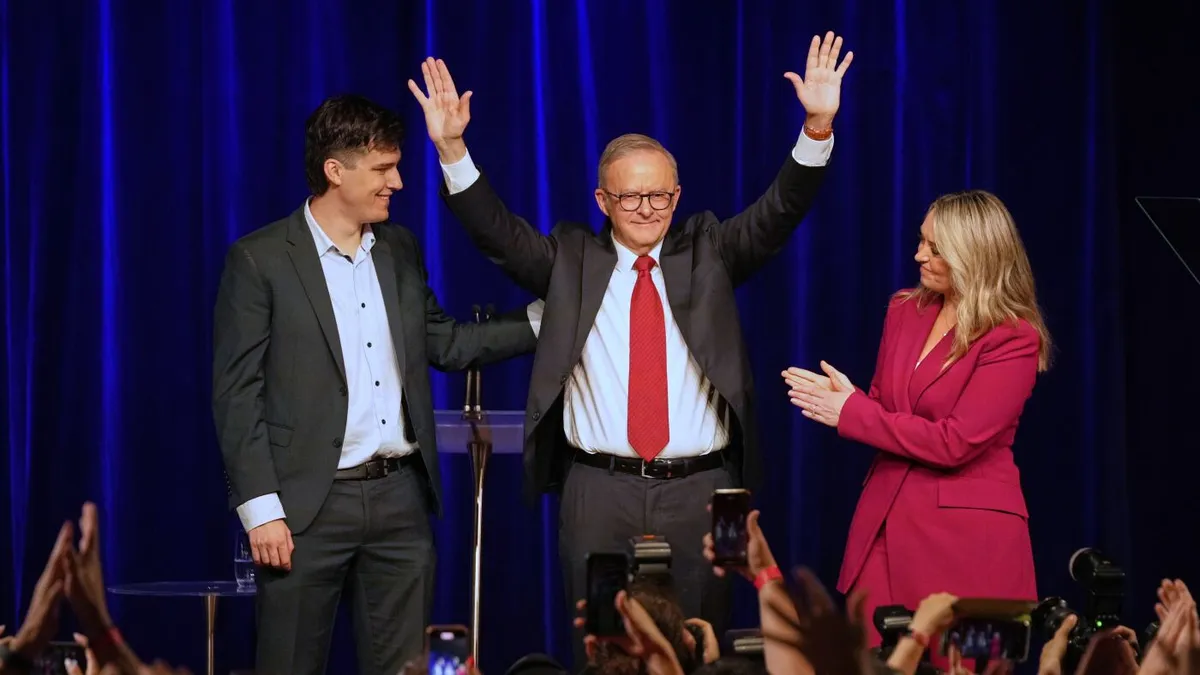
MELBOURNE, Australia — In a historic victory, Anthony Albanese has become the first Australian prime minister to secure a second consecutive term in 21 years. Celebrating his win on Saturday, Albanese emphasized that his government has increased its majority by rejecting the approach of U.S. President Donald Trump. In his victory speech delivered to supporters in Sydney, Albanese stated, “Australians have chosen to face global challenges the Australian way, looking after each other while building for the future.” He further asserted, “We do not need to beg or borrow or copy from anywhere else. We do not seek our inspiration overseas. We find it right here in our values and in our people.”
Albanese's center-left Labor Party effectively criticized his rival, Peter Dutton, the opposition leader, by branding him as "DOGE-y Dutton." The party accused Dutton's Liberal Party of imitating Trump and his controversial Department of Government Efficiency. After the election results were announced, Dutton conceded defeat and noted that he had lost his parliamentary seat, which he had held for an impressive 24 years. This outcome mirrors the recent political landscape in Canada, where the last opposition leader, Pierre Poilievre, also lost his seat following Trump's aggressive economic policies.
Political analysts believe that the conservative alliance’s attempt to align with Trump backfired, especially after the former president imposed global tariffs. The minor party, Trumpet of Patriots, which draws inspiration from Trump’s policies and is financially backed by mining magnate Clive Palmer, managed to garner only 2% of the vote, indicating a lack of support for this approach among Australian voters.
Following Albanese's victory, U.S. Secretary of State Marco Rubio extended his congratulations, highlighting Australia as a valued ally and partner of the United States. Rubio stated, “Our shared values and democratic traditions provide the bedrock for an enduring alliance and for the deep ties between our peoples.” He expressed optimism about strengthening the relationship between the two nations to further common interests and promote stability in the Indo-Pacific region and beyond.
The Labor Party maintained a narrow majority of 78 seats in the 151-seat House of Representatives, the lower chamber where governments are formed. Traditionally, Australian governments face challenges in retaining their majority during a second term election, often losing seats. However, Labor is poised to increase its majority in this new term, showcasing the party's growing support.
During the election campaign, energy policy and inflation emerged as critical issues, with both parties acknowledging the ongoing cost of living crisis. The Liberal Party attributed rising inflation and interest rates to government waste and pledged to eliminate over 20% of public service jobs to cut spending. While both parties agreed on the necessity of achieving net-zero greenhouse gas emissions by 2050, Dutton proposed nuclear energy as a cost-effective alternative to renewable sources like solar and wind.
Labor raised concerns that Dutton's administration would slash essential services to fund its ambitious plan to establish seven government-funded nuclear generators, especially since Australia currently has no nuclear power infrastructure. Opposition senator Jacinta Nampijinpa Price would have been responsible for reducing 41,000 public service jobs in Dutton's administration. Price previously drew media attention for her remarks that echoed the Trump campaign's slogan, "Make America Great Again," despite claiming she didn't intend to make that association.
The election unfolded amidst a backdrop of what both political factions described as a severe cost of living crisis. According to Foodbank Australia, the nation’s largest food relief charity, 3.4 million households in the country of 27 million experienced food insecurity last year, illustrating the struggles many Australians face in affording basic necessities. The central bank responded by reducing its benchmark cash interest rate by a quarter percentage point to 4.1%, signaling that the worst of the financial hardship may be over. Another rate cut is widely anticipated at the bank's upcoming meeting, aimed at encouraging investment amid ongoing economic uncertainty influenced by Trump’s tariff policies.